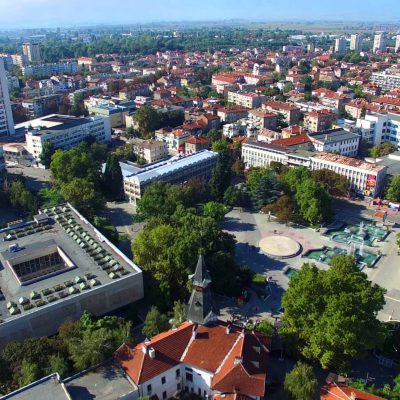
From October 2021 to September 2023, the Biocircularcities project will unlock the circular economy potential of unexploited bio-based waste streams by exploring the development of economically and environmentally efficient models for organic waste in three pilot areas. The Province of Pazardzhik is one of them!
От октомври 2021 г. до септември 2023 г. проектът Biocircularcities ще отключи потенциала за кръгова икономика на неизползваните количества от отпадъци на биологична основа, като проучи разработването на икономически и екологично ефективни модели за органични отпадъци в три пилотни области. Област Пазарджик е една от тях!

Population: 251,300
Area: 4, 458 km2
Density: 56 inh/km2
About 56% of the total area is covered by forests, which predefines the huge waste biomass potential in the region
Value chain targeted: unrecovered forestry residues
Население: 251 300 души
Площ: 4 458 км2
Гъстота на населението: 56 inh/km2
Около 56% от общата площ е покрита с гори, което предопределя огромния потенциал за отпадъчна биомаса в региона
Целева верига: неизползвани отпадъци от горската индустрия
The situation: Separate collection of biowaste in the region of Pazardzhik, as well as in Bulgaria in general, is in its very early stage and only few pilot projects are in place. The Province of Pazardzhik represents a typical rural region with a well-developed agricultural sector, including forestry and farming. There are significant unexploited potentials of agricultural wastes and wood biomass, which derives from the local agricultural and forestry sectors. In 2017, around 60% of the total wood residues were used for energy purposes (pellet production), less than 5% was destined to composting and 35% remained in forests unused, causing frequent fires.
The goal: Involving local stakeholders for the larger deployment of circular bioeconomy in a rural region to tackle unexploited bio-waste from agriculture and forestry sectors.
Current management chain: forestry residues wood processing waste is landfilled or disposed in the forests.
Biocircularcities Alternative scenario:
- collection and transport of biowaste (both forestry residues and wood processing waste)
- energy valorisation (e.g. CHP plant) or/and lignocellulosic valorisation (e.g. production of biochemicals).
Lignocellulosic valorisation is the main option, but it will be also compared to the energy recovery optionto evaluate the environmental and economic performance of both alternative scenarios.
Ситуацията: Разделното събиране на биоотпадъци в района на Пазарджик, както и в България като цяло, е в много начален етап и има само няколко пилотни проекта. Провинцията в Пазарджик представлява типичен селски район с добре развит селскостопански сектор, включително горско стопанство и земеделие. Съществува значителен неизползван потенциал от селскостопански отпадъци и дървесна биомаса, които произлизат от местните земеделски и горски сектори. През 2017 г. около 60% от цялото количество на горската биомаса е било използвано за енергийни нужди (напр. за производство на пелети), по-малко от 5% е използвано за производство на компост и около 35% от отпадъчната дървесина не е използвана, което води и до голям риск от горски пожари.
Целта: Включване на местни заинтересовани страни за по-широко внедряване на кръгова биоикономика в селски регион за справяне с неексплоатираните биологични отпадъци от селското и горското стопанство.
Настояща верига на отпадъци: горски отпадъци и отпадъци от дървопреработващата промишленост, които остават неизползвани в горите.
Алтернативни сценарии от проект BIOCIRCULARCITIES:
- събиране и транспортиране на биоотпадъци (горски и от преработващата промишленост)
- енергийна употреба (напр. когенерация) и/или лигноцелулозна употреба (напр. производство на биохимикали).
Лигноцелулозната употреба е основната опция, но тя също ще бъде сравнена с опцията за производство на енергия, за да се оцени екологичното и икономическото въздействие на двата алтернативни сценария.
Biocircularcities in brief #4
A short overview of our activities between June and September 2023.
Biocircularcities in brief #3
A short overview of our activities between December 2022 and May 2023.
Biocircularcities in brief #2
A short overview of our activities between June 2022 and November 2022.
Biocircularcities in brief #1
A short overview of our activities between October 2021 and May 2022.
Biocircularcities in a nutshell – Leaflet
Biocircularcities Брошура / Biocircularcities tríptic / Biocircularcities folleto / Biocircularcities opuscolo
NewsView more
19 June 2023
Biocircularcities presents its results in PazardzhikПроект BIOCIRCULARCITIES с финално събитие в Пазарджик, България
The final event of the Biocircularcities project for the Pazardzhik province took place on 8 June…
1 June 2023
Experts discuss the environmental impact and policy recommendations for collecting and treating forest residuesThe 3rd Peer Review Session of the Biocircularcities project was held on 23-24 May 2023. It…
14 April 2023
Local stakeholders discuss the potential impact of forestry waste management in PazardzhikHow to support decision-making to improve the management of forestry waste? This was the question that…
EventsMore events
8 June 2023 | Pazardzhik
Biocircularcities unlocked – The Pazardzhik stopWhat has been the impact of the Biocircularcities project in Pazardzhik? How has the project managed…
28 March 2023 | Online
Pazardzhik Local Living Lab #3“Preliminary results from sustainability assessment for the selected biowaste chain and presentation of the Biocircularcities webtool…
30 September 2022 | Online
Pazardzhik Local Living Lab #2The objective of this second local Living Lab for the Province of Pazardzhik was to identify…
